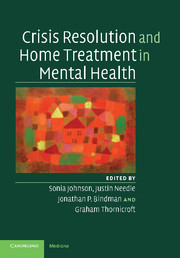Book contents
- Frontmatter
- Contents
- List of contributors
- Foreword
- Acknowledgements
- Section 1 Introduction and concepts
- Section 2 The evidence
- Section 3 Current practice
- Section 4 Variations and enhancements
- 19 Integration of the crisis resolution function within community mental health teams
- 20 Home treatment and ‘hospitality’ within a comprehensive community mental health centre
- 21 Crisis resolution teams and older people
- 22 Integrating day treatment and crisis resolution teams
- 23 Integrating crisis residential care and crisis resolution teams
- Section 5 Developing a local service
- Index
- References
19 - Integration of the crisis resolution function within community mental health teams
from Section 4 - Variations and enhancements
Published online by Cambridge University Press: 13 August 2009
- Frontmatter
- Contents
- List of contributors
- Foreword
- Acknowledgements
- Section 1 Introduction and concepts
- Section 2 The evidence
- Section 3 Current practice
- Section 4 Variations and enhancements
- 19 Integration of the crisis resolution function within community mental health teams
- 20 Home treatment and ‘hospitality’ within a comprehensive community mental health centre
- 21 Crisis resolution teams and older people
- 22 Integrating day treatment and crisis resolution teams
- 23 Integrating crisis residential care and crisis resolution teams
- Section 5 Developing a local service
- Index
- References
Summary
There is now a substantial body of evidence to support the inclusion of a 24-hour mobile community crisis response (Hoult et al., 1984; Rosen, 1997; Johnson et al., 2005) and case management based on a continuity of care principle (Rosen and Teesson, 2001) as components in all local psychiatric service systems. At the same time, there is considerable confusion and blurring in the literature between crisis and emergency psychiatric response services (e.g. American Psychiatric Association Task Force on Psychiatric Emergency Services, 2002), and between discrete crisis teams and combined crisis and case management teams (extended hours teams (EHTs)). While Thornicroft and Tansella (2002) endorsed both crisis and case management components as essential parts of a balanced hospital and community mental health service, Rosen (2002) has emphasised the importance of integrating all these components of a local service as much as possible. Thornicroft and Tansella (2004) proposed that combined generic community mental health teams (CMHTs) without differentiation into specialised components (e.g. crisis, early intervention, assertive case management) represent a stage of evolution of a service. Enhanced material resources will allow it to become a more differentiated service, including these components as linked but distinct elements. They argued that the evidence base is stronger for such specialised components than for generic teams. While there is evidence to support this in some cases, no proper test has ever been carried out of whether specialist crisis resolution teams (CRTs: also known as intensive home treatment teams, crisis assessment and treatment teams, access teams and psychiatric emergency teams) are preferable to combined crisis and case management teams (Glover et al. 2006; see Chapter 5).
- Type
- Chapter
- Information
- Crisis Resolution and Home Treatment in Mental Health , pp. 235 - 250Publisher: Cambridge University PressPrint publication year: 2008
References
- 4
- Cited by

